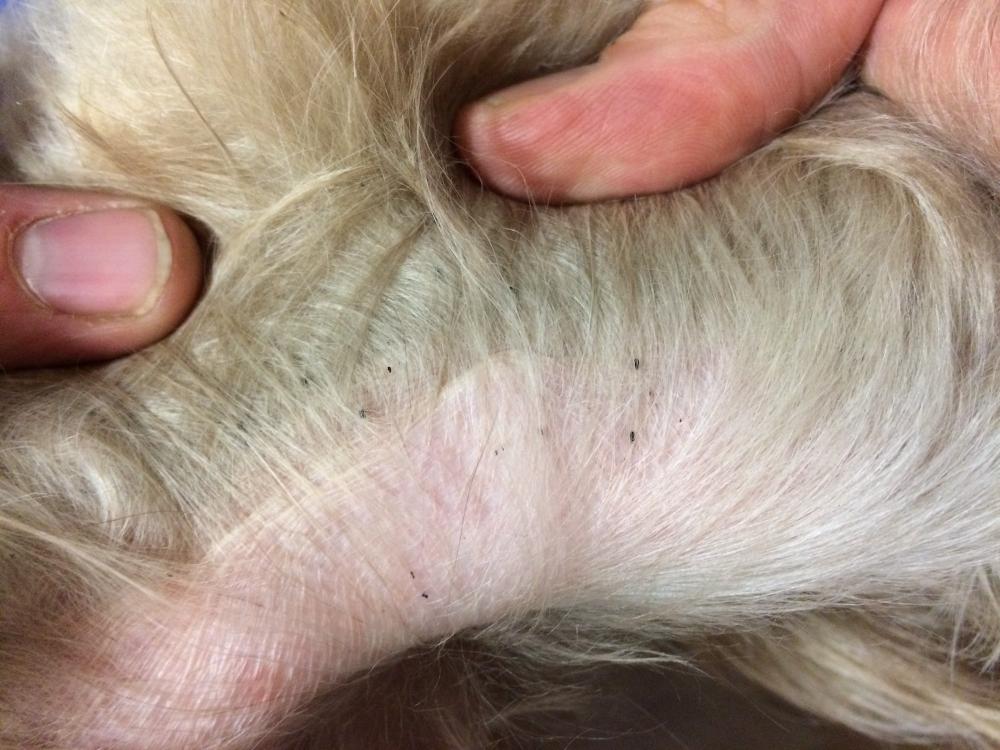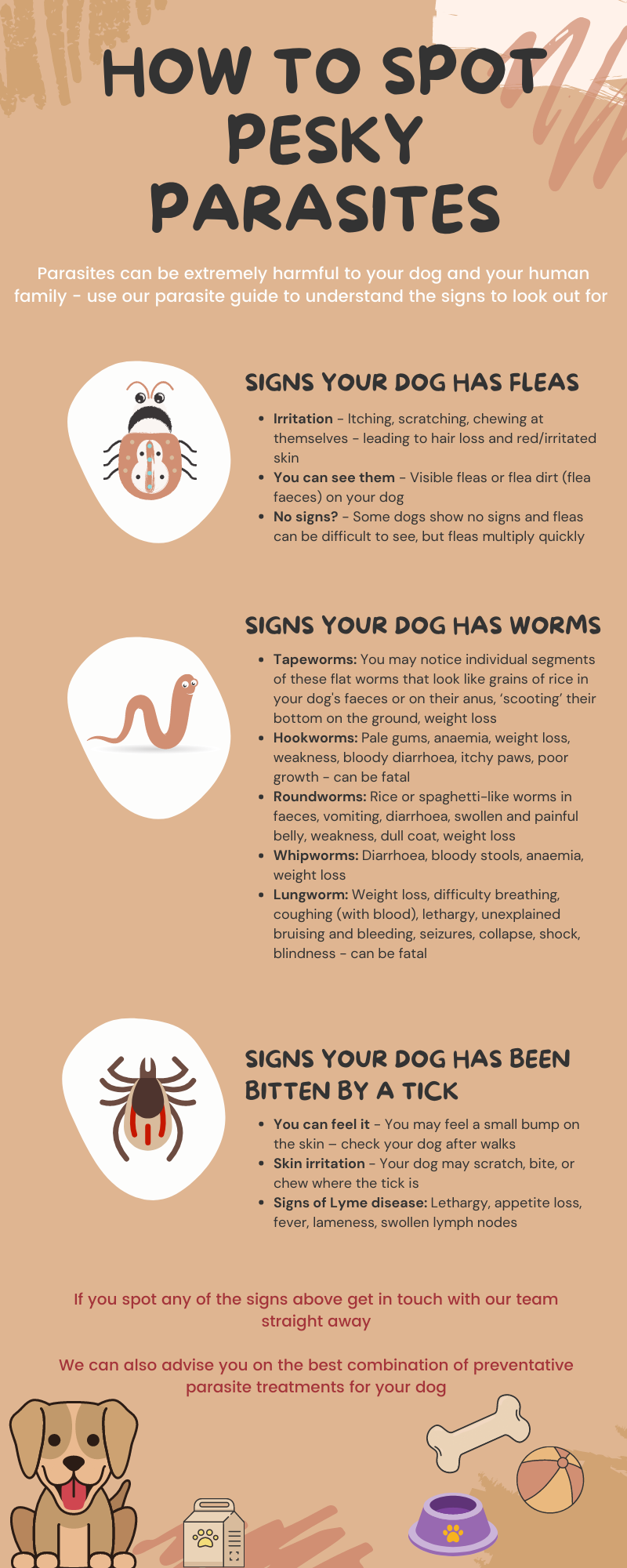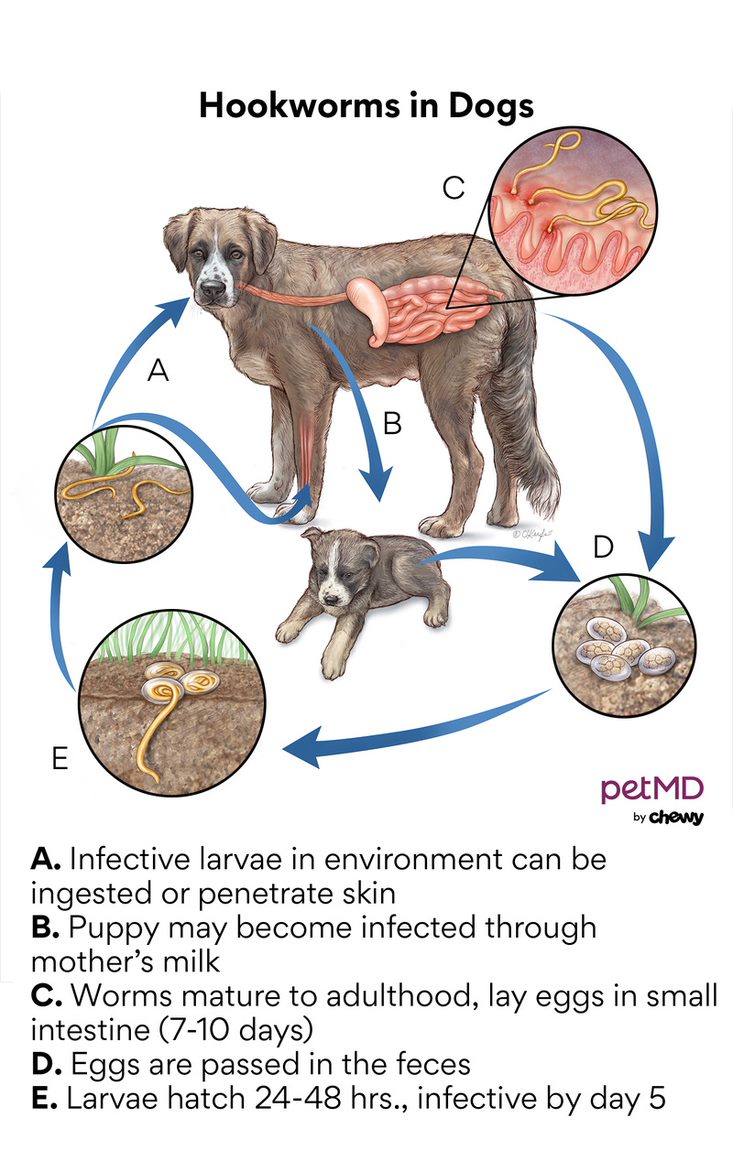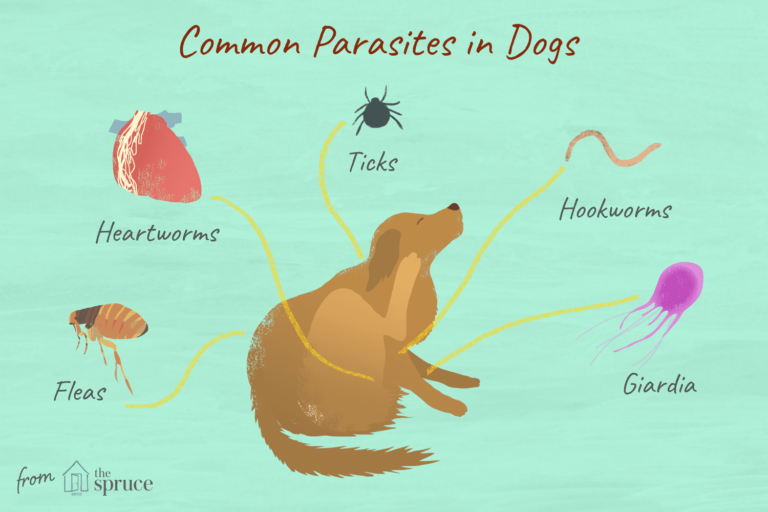To determine if your dog has parasites, consult with your veterinarian for a diagnosis and appropriate treatment. It’s crucial to seek professional guidance in identifying and addressing potential parasite infestations in your dog.

Credit: www.bluecross.org.uk
Signs And Symptoms Of Dog Parasites
It can be challenging to determine if your dog has parasites, but there are signs and symptoms to watch out for. These include loose stools and diarrhea, vomiting, weight loss, a distended abdomen, visible worms in feces, respiratory issues, malnutrition, and loss of appetite.
If you suspect your dog has parasites, it’s crucial to consult a veterinarian for proper diagnosis and treatment.
Internal Parasites
If you’re worried about your furry friend having parasites, it’s important to know the signs and symptoms to look out for. Internal parasites are parasitic organisms that live inside your dog’s body, often in their digestive system. These pests can cause a range of problems for your canine companion.External Parasites
Apart from internal parasites, your dog can also be plagued by external parasites. These parasitic organisms usually live on the outside of your dog’s body, feeding off them and causing discomfort. Common external parasites include fleas, ticks, and mites. These critters can cause intense itching, redness, skin irritation, and can even transmit diseases to your dog.How To Tell If Your Dog Has Worms
Symptoms of internal parasites in dogs include:
- Loose stools and/or diarrhea
- Vomiting
- Weight loss
- Distended abdomen
- Visible worms in feces
- Respiratory issues
- Malnutrition and loss of appetite
What to look for in your dog’s poop:
Whipworms look like tiny pieces of thread that are enlarged on one end. Roundworms look like spaghetti and may be several inches long. Tapeworms aren’t usually seen in dog poop, but their egg sacs, which look like grains of rice, can be found in dog poop or sticking to a dog’s behind.
How to get rid of parasites on your dog:
Roundworms and hookworms can be treated with a product containing pyrantel pamoate. Dogs with tapeworms should be treated with praziquantel (available over the counter or from your veterinarian). A whipworm infestation may be treated with fenbendazole available from your veterinarian.
Knowing the signs and symptoms of dog parasites is crucial for the well-being of your furry friend. Regular checkups with your vet and proper preventive measures can help keep these pesky parasites at bay. Remember, the sooner you identify and treat your dog’s parasites, the better it will be for their overall health and happiness!
Credit: www.starvetclinic.co.uk
Diagnosing And Treating Dog Parasites
Diagnosing and treating dog parasites is crucial for the health of your furry friend. Look out for symptoms like diarrhea, vomiting, weight loss, and visible worms in their feces and consult a veterinarian for proper treatment.
How Will A Veterinarian Diagnose Parasites In My Dog?
When it comes to diagnosing parasites in your beloved furry friend, your veterinarian is your best resource. They follow a systematic approach to determine if your dog is suffering from any parasites.
To begin, the veterinarian will conduct a thorough physical examination of your dog. They will check for any visible signs of parasites, such as skin irritations, visible worms in the feces, or a distended abdomen. This initial examination helps the veterinarian gather important clues about your dog’s health and potential parasite infestations.
Next, they may ask you to provide a stool sample. This is essential to check for the presence of internal parasites such as roundworms, hookworms, or whipworms. The stool sample is examined under a microscope to detect any eggs or larvae, which are indicative of a parasite infestation.
In some cases, your veterinarian may recommend blood tests to diagnose certain types of parasites, such as heartworms. These tests can detect the presence of specific antibodies or antigens that indicate the presence of parasites in your dog’s bloodstream.
Additionally, your veterinarian may suggest further diagnostic imaging such as X-rays or ultrasounds to visualize and identify any internal parasites that may be causing problems. This helps to confirm the diagnosis and determine the severity of the infestation.
Common Parasite Treatment Options
Once your veterinarian has diagnosed a parasite infestation in your dog, they will recommend the appropriate treatment plan. The treatment options will vary depending on the type of parasites your dog is affected by.
For internal parasites, such as roundworms or hookworms, your veterinarian may prescribe deworming medication. These medications are usually given orally and target the parasites, eliminating them from your dog’s system. It’s essential to follow the recommended dosage and treatment schedule provided by your veterinarian.
In the case of external parasites like fleas or ticks, your veterinarian may recommend topical treatments or oral medications that kill and prevent future infestations. These treatments often target not only the adult parasites but also their eggs and larvae, ensuring comprehensive protection for your furry companion.
It’s important to understand that different parasites may require specific treatment methods, so always consult your veterinarian for the best approach.
Preventing And Controlling Dog Parasites
Preventing and controlling parasites in your dog is crucial for their overall well-being. Fortunately, there are several proactive measures you can take to minimize the risk of parasite infestations.
Regularly administer preventive medications recommended by your veterinarian to protect your dog against a wide range of parasites. These preventive treatments are often available in the form of monthly tablets, topical applications, or collars.
Maintain a clean living environment for your dog, ensuring a regular cleaning routine. Regularly vacuuming your home, washing your dog’s bedding, and keeping the yard free from debris can significantly reduce the risk of exposure to certain parasites.
Practice good hygiene habits such as washing your hands after handling your dog, especially after cleaning up their waste, to minimize the potential spread of parasites.
Regularly groom your dog to check for any signs of external parasites, such as fleas or ticks. Grooming can also help to remove any dead hair and keep your dog’s coat in good condition.
In conclusion, diagnosing and treating dog parasites requires the expertise of a veterinarian. By following their recommendations, administering preventive measures, and maintaining good hygiene practices, you can ensure your furry friend stays free from harmful parasites and leads a healthy, happy life.
Importance Of Early Detection And Treatment
Early detection and treatment of parasites in dogs is crucial for their overall health. Common symptoms include loose stools, vomiting, weight loss, and visible worms in the feces. If you suspect your dog has parasites, it is important to consult a veterinarian for proper diagnosis and treatment.
Why Early Detection Is Important
Detecting parasites in your dog at an early stage is crucial for their overall health and well-being. When left untreated, parasites can cause severe health issues for your furry friend. Early detection allows for prompt treatment, preventing further complications and reducing the risk of transmission to other pets or humans.Consequences Of Untreated Parasites
Leaving parasites untreated can have serious consequences for your dog. These include:1. Health Complications: Parasites can cause a range of health problems such as internal bleeding, organ damage, anemia, and malnutrition. These conditions can lead to a weakened immune system, making your dog more susceptible to other illnesses. 2. Discomfort and Pain: Parasites can cause discomfort and pain for your dog, leading to behavioral changes such as restlessness, constant itching, and changes in appetite. This can negatively impact their quality of life. 3. Transmission to Other Pets and Humans: Certain parasites, like fleas and ticks, can easily spread to other pets and even humans. This puts everyone at risk of developing parasitic infections and related health issues. Preventing the spread of parasites is important for the well-being of your entire household.Tips For Regular Parasite Monitoring
Regular monitoring and preventive measures are essential to ensure your dog remains parasite-free. Here are some tips:1. Routine Veterinary Check-ups: Regular visits to your veterinarian allow for thorough examinations and early detection of parasites. Your vet can perform tests, such as fecal examinations, to identify any presence of internal parasites. 2. Maintain a Clean Environment: Regularly clean and sanitize your dog’s living area to minimize the risk of parasites. Vacuum carpets, wash bedding, and remove any debris or potential hiding spots for fleas or ticks. 3. Frequent Grooming: Regular grooming sessions not only keep your dog looking good but also help spot any external parasites like fleas or ticks. Brushing their fur can also help remove flea eggs or ticks before they become a problem. 4. Administer Preventive Medications: Consult with your veterinarian to determine the appropriate parasite prevention medications for your dog. These can include flea and tick preventives, heartworm preventives, and deworming treatments. Administer these medications as directed to ensure continuous protection against parasites. Early detection and treatment of parasites are crucial for your dog’s health and the overall well-being of your household. By implementing these tips for regular parasite monitoring, you can effectively safeguard your furry friend from the harmful consequences of untreated parasites. Remember, prevention and proactive measures are key to keeping your dog parasite-free and happy.
Credit: www.petmd.com
Frequently Asked Questions For How Do I Know If My Dog Has Parasites
What Are The Symptoms Of A Parasite In A Dog?
Symptoms of a parasite in a dog include loose stools, vomiting, weight loss, distended abdomen, visible worms in feces, respiratory issues, and loss of appetite. If you suspect your dog has a parasite, consult a veterinarian for diagnosis and treatment.
What Does Dog Poop Look Like With Parasites?
Dog poop with parasites can have different appearances depending on the type of parasite. Whipworms look like enlarged thread ends, roundworms resemble spaghetti and can be several inches long, and tapeworms may not be visible in the poop but their egg sacs, resembling grains of rice, can be found in the feces or sticking to the dog’s anus.
How Do You Get Rid Of Parasites On A Dog?
To get rid of parasites on a dog, use products containing pyrantel pamoate for roundworms and hookworms, praziquantel for tapeworms, and fenbendazole for whipworms. Consult a veterinarian for proper diagnosis and treatment.
Does My Dog Have Worms Or Parasites?
If your dog is coughing, vomiting, has diarrhea, or seems lethargic, they may have worms. Look for rapid weight loss or grains of rice in their stool to check for tapeworms. It’s important to consult a veterinarian for proper diagnosis and treatment.
Conclusion
If you suspect that your dog has parasites, it is crucial to seek immediate veterinary attention. A veterinarian will be able to accurately diagnose the issue and provide appropriate treatment. Remember, early detection is key in successfully addressing parasites in dogs.
Keep an eye out for common symptoms such as diarrhea, vomiting, weight loss, and visible worms in the feces. By being proactive and seeking professional help, you can ensure the health and well-being of your furry friend.



